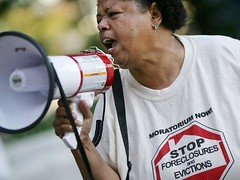
Sandra Hines of the Moratorium Now! Coalition to Stop Foreclosures and Evictions speaks to the rally protesting the proposed trillion dollar bailout of Wall Street, Sept. 25, 2008. (Free Press Photo).
Originally uploaded by Pan-African News Wire File Photos
State reps. flooded with bailout protest calls
By TODD SPANGLER
FREE PRESS WASHINGTON STAFF
WASHINGTON – Michigan representatives in Congress are being deluged with calls and e-mails on the $700 billion bailout proposal being debated on Capitol Hill – with a lot of constituents clearly against taxpayers being on the hook for propping up failing financial institutions.
A spokeswoman for Rep. Mike Rogers, a Brighton Republican, said his office had received upward of 2,000 calls and e-mails in the last three days on the subject, with almost all against the bailout. And at the offices of Rep. Joe Knollenberg, R-Bloomfield Township, there have been more than 1,000 contacts – largely against the bailout as proposed by the White House and Treasury Secretary Henry Paulson.
Knollenberg, in a statement, said he could not support the administration proposal because of worries “that too much risk is being placed on taxpayers who did not cause this problem and too much faith is being paced in government ownership and control of the private sector.”
He said he was working with colleagues to develop “a better alternative” that would provide reforms and restore confidence in the markets “without putting the taxpayer on the hook.”
President George W. Bush and administration officials have been calling for quick action, and economists seem generally in agreement that credit markets have slowed to a point where, unless something is done, the American economy could fall into a deep spiral. Bad mortgage debts have led to many institutions having a very difficult time raising capital – that, in turn, has led to failures, bankrupticies and government takeovers of some of those institutions.
Those actions, however, have not raised confidence in the markets and freed up money to lend. And if financial institutions aren’t swapping money, cash for loans to individuals and business dries up – eventually impacting spending, and, in turn, jobs.
“The outcomes are so horrible you just have to stave those outcomes off,” said Dana Johnson, Comerica’s chief economist. “I don’t think there is any way of exaggerating the precarious nature of what’s going on right now.”
But there is no doubt an argument about what should be done about it.
David Littmann, senior economist with the libertarian Mackinac Center for Public Policy, said unless reforms are made – such as lowering taxes to allow that money to be used for investing – Congress might “kick the can down the road” but it won’t stave off a recession forever.
Asking for real reform of the kind he says would be helpful – like cutting the capital gains tax – in the middle of a presidential election “is like asking for divine intervention,” Littman acknowledged.
1 comment:
I called my Senators and Rep. here in NYC and told them I wanted them to vote against the bailout and to only bail out homeowners.
Post a Comment